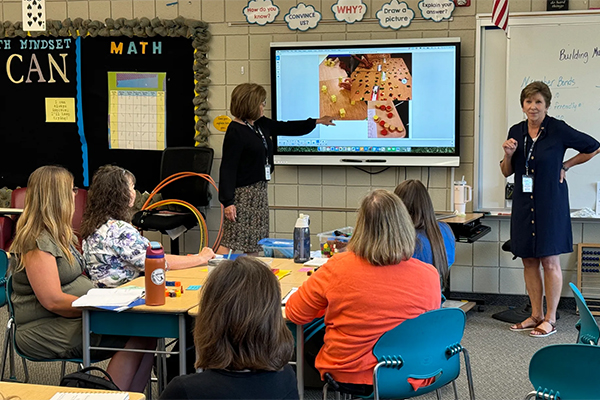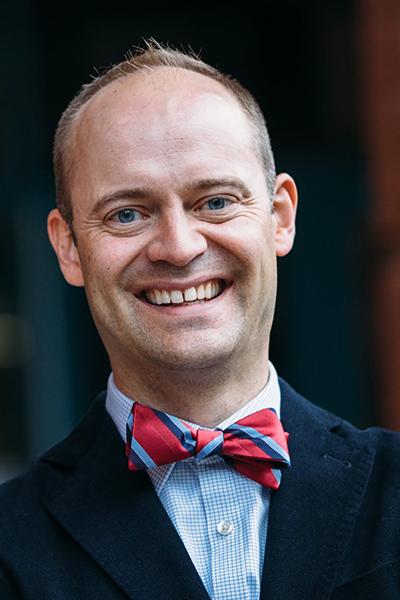Edith Bowen Laboratory School Receives Funding to Enhance Teacher Learning Opportunities in Utah

Teachers participate in a LEARNS conference workshop at Edith Bowen Laboratory School.
In June 2024, the Edith Bowen Laboratory School (EBLS), a K-6 charter school housed within the Emma Eccles Jones College of Education and Human Services (CEHS) on the USU campus, hosted the first annual Utah Learning for Educators and Researchers through Networked Systems (LEARNS) conference. Edith Bowen received a $50,000 three-year innovation grant from the Utah State Charter School Board to help fund the conference and a $50,000 two-year teacher leadership grant from the Utah State Board of Education (USBE) to grow the Utah LEARNS network.
“Our first grant application was awarded based on the model for the Utah LEARNS conference created by our team at Edith Bowen. Our goal was to connect teachers in Northern Utah for one full day,” shared Edith Bowen Principal Nate Justis. “We felt the state would be interested in outreach opportunities to help retain teachers.”
The mission of Utah LEARNS is to connect elementary educators throughout Utah in ways that allow them to share their expertise and to access scholars and research so they might improve their professional practice and empower student learning.
Justis explains that the idea of connection came from his Fulbright Scholar Exchange experience in Singapore where teachers would connect with, learn from, and coach each other on a regular basis. “Teachers were supporting other teachers,” noted Justis. “I wondered what it would be like to create a statewide network in Utah that connects teachers.

Dr. Nate Justis, principal at Edith Bowen Laboratory School
The one-day conference featured keynote speaker Gregory Benner from the University of Alabama, who spoke on practical trauma-informed behavioral strategies for the classroom. The remaining speakers were faculty members at Edith Bowen who taught workshops at the school. Participants also went out on field studies that included canoeing on the Cutler Marsh, visiting the beaver pond in Logan Canyon, and other outdoor activities.
“It was outstanding. I wish more educators from my district and school had participated,” remarked a Utah LEARNS conference participant. “I’m going to spread the word and let my grade-level team, district, and principal know what an outstanding opportunity it was. I’m really glad that I came! I have practical, ready-to-use strategies to use for my classroom.”
Sondra Knudsen, a kindergarten teacher in Logan City District School, also shared her thoughts about the conference. “Attending the Utah LEARNS conference was truly inspiring for me. I connected with other educators from around the state who are passionate about making a difference. The experience reignited my enthusiasm for teaching. I came away with a toolkit of ideas and strategies that will enhance my students’ learning experiences and help me grow as an educator.”
For next year’s LEARNS conference, Justis has high hopes. “I hope we fill the state with conferences in other locations, identify the high-performing schools throughout Utah, and that this model can become a hub for Utah LEARNS,” he said. “I also want to bring in teachers from throughout the state and create connections. I hope to find or develop a web-based platform where teachers can connect and share their resources.”
Similarly, the Mentoring and Supporting Teacher Effectiveness and Refinement (MASTER) pilot grant was recently awarded to EBLS by the USBE. This grant is a companion grant to the Utah LEARNS grant and is a $50,000 award that extends for two years.
“The MASTER grant program is looking for ways that applicants can support and mentor other teachers during the school year. It is also a leadership opportunity for teachers,” explains Justis. “Teachers coaching other teachers, especially first- and second-year teachers, is very valuable. The grant will pay for substitute teachers to assist in the classroom while teachers are coaching other teachers or leading a small learning team of teachers.”
The overall goal of MASTER is for teachers to connect monthly on Zoom or through in-person on-site visits, which enables teachers in all areas of the state—even rural, remote areas—to participate.
Justis recognizes the benefits of hosting the Utah LEARNS conference and the MASTERS pilot program on the USU campus. “Both programs help to fulfil our land grant mission,” he says. “Expert teachers are sharing their knowledge, and the experience has been so valuable for everyone.”
Joey Kozlowski, a second-grade teacher at EBLS, commented, “The MASTER grant is supporting my collaboration with other experts on integrating field experiences with teaching mathematics. Also, there are plans to take the knowledge we develop and share it with other educators at the regional and state levels.”
Justis concludes, “The program will help our teachers develop a sense of self as professionals. Our goal is for teachers in any county to reach out to a mentor teacher and ask to be coached or to connect on a certain principle. This model helps teachers realize how much they can learn from and offer to other teachers.”

